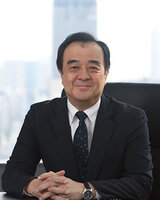Event Report Foreign Affairs and National Security
Mr. Tom Malinowski Special Lecture
January 25, 2013
Venue: CIGS Meeting Room 3
Summary
On January 25, 2013, Tom Malinowski, the Washington Director of Human Rights Watch, spoke to a select roundtable of foreign policy experts at the Canon Institute for Global Studies. The event with Mr. Malinowski is the first in what will be a series of discussions at CIGS, featuring policymakers and public intellectuals from Washington who are visiting Tokyo.
Mr. Malinowski is one of the most influential voices on human rights issues in Washington, DC today. A former chief foreign policy speechwriter on the National Security Council for President Clinton, he has worked since 2000 at Human Rights Watch, which is a highly respected foreign policy-related non-governmental organization.
In his talk, Mr. Malinowski spoke about the situation in Syria and Myanmar, having visited both countries within the past month. He also discussed North Korea.
In the case of Syria, Mr. Malinowski explained that he had recently spent a week in the opposition-controlled northern part of the country, including the city of Aleppo, near the Syrian border. He warned that the situation there is growing increasingly dire, with a worsening shortages of food and fuel. He also said that the Assad regime is continuing to use airpower-including ballistic missiles - to terrorize the population, and that Human Rights Watch has documented instances of the regime deliberately targeting civilian sites, such as bread lines, to inflict maximum casualties.
Mr. Malinowski went on to explain that the foremost demand he heard from Syrians was for in ternational military intervention to neutralize Assad's use of airpower. He also warned that he encountered widespread anger, frustration, and confusion among Syrians at the failure of the world to come to their defense--with particular focus on the perceived inaction of the United States.
In the case of North Korea, Mr. Malinowski argued that, given the failure of diplomacy to convince Pyongyang to abandon its nuclear weapons program and other illicit behavior, and the unlikelihood that it will do so now, the United States and like-minded allies such as Japan should instead consider a new approach, focused on human rights.
In particular, Mr. Malinowski noted that there was an opportunity to establish the first-ever commission of inquiry into human rights abuses in North Korea at the UN Human Rights Council, and that Prime Minister Abe had indicated support for such an initiative.
Lastly, with respect to Myanmar, Mr. Malinowski explained that he had just come back from a week in the country, where he had met with a range of officials and opposition leaders. Mr. Malinowski urged the United States and Japan to be careful and coordinated as they invest in Myanmar, so that funding serves to strengthen rather than undermine the country's still-fragile democratic development. He also noted continuing human rights abuses in ethnic minority regions, and questions about the extent to which the government exercises control over the military.
On January 25, 2013, Tom Malinowski, the Washington Director of Human Rights Watch, spoke to a select roundtable of foreign policy experts at the Canon Institute for Global Studies. The event with Mr. Malinowski is the first in what will be a series of discussions at CIGS, featuring policymakers and public intellectuals from Washington who are visiting Tokyo.
Mr. Malinowski is one of the most influential voices on human rights issues in Washington, DC today. A former chief foreign policy speechwriter on the National Security Council for President Clinton, he has worked since 2000 at Human Rights Watch, which is a highly respected foreign policy-related non-governmental organization.
In his talk, Mr. Malinowski spoke about the situation in Syria and Myanmar, having visited both countries within the past month. He also discussed North Korea.
In the case of Syria, Mr. Malinowski explained that he had recently spent a week in the opposition-controlled northern part of the country, including the city of Aleppo, near the Syrian border. He warned that the situation there is growing increasingly dire, with a worsening shortages of food and fuel. He also said that the Assad regime is continuing to use airpower-including ballistic missiles - to terrorize the population, and that Human Rights Watch has documented instances of the regime deliberately targeting civilian sites, such as bread lines, to inflict maximum casualties.
Mr. Malinowski went on to explain that the foremost demand he heard from Syrians was for in ternational military intervention to neutralize Assad's use of airpower. He also warned that he encountered widespread anger, frustration, and confusion among Syrians at the failure of the world to come to their defense--with particular focus on the perceived inaction of the United States.
In the case of North Korea, Mr. Malinowski argued that, given the failure of diplomacy to convince Pyongyang to abandon its nuclear weapons program and other illicit behavior, and the unlikelihood that it will do so now, the United States and like-minded allies such as Japan should instead consider a new approach, focused on human rights.
In particular, Mr. Malinowski noted that there was an opportunity to establish the first-ever commission of inquiry into human rights abuses in North Korea at the UN Human Rights Council, and that Prime Minister Abe had indicated support for such an initiative.
Lastly, with respect to Myanmar, Mr. Malinowski explained that he had just come back from a week in the country, where he had met with a range of officials and opposition leaders. Mr. Malinowski urged the United States and Japan to be careful and coordinated as they invest in Myanmar, so that funding serves to strengthen rather than undermine the country's still-fragile democratic development. He also noted continuing human rights abuses in ethnic minority regions, and questions about the extent to which the government exercises control over the military.
